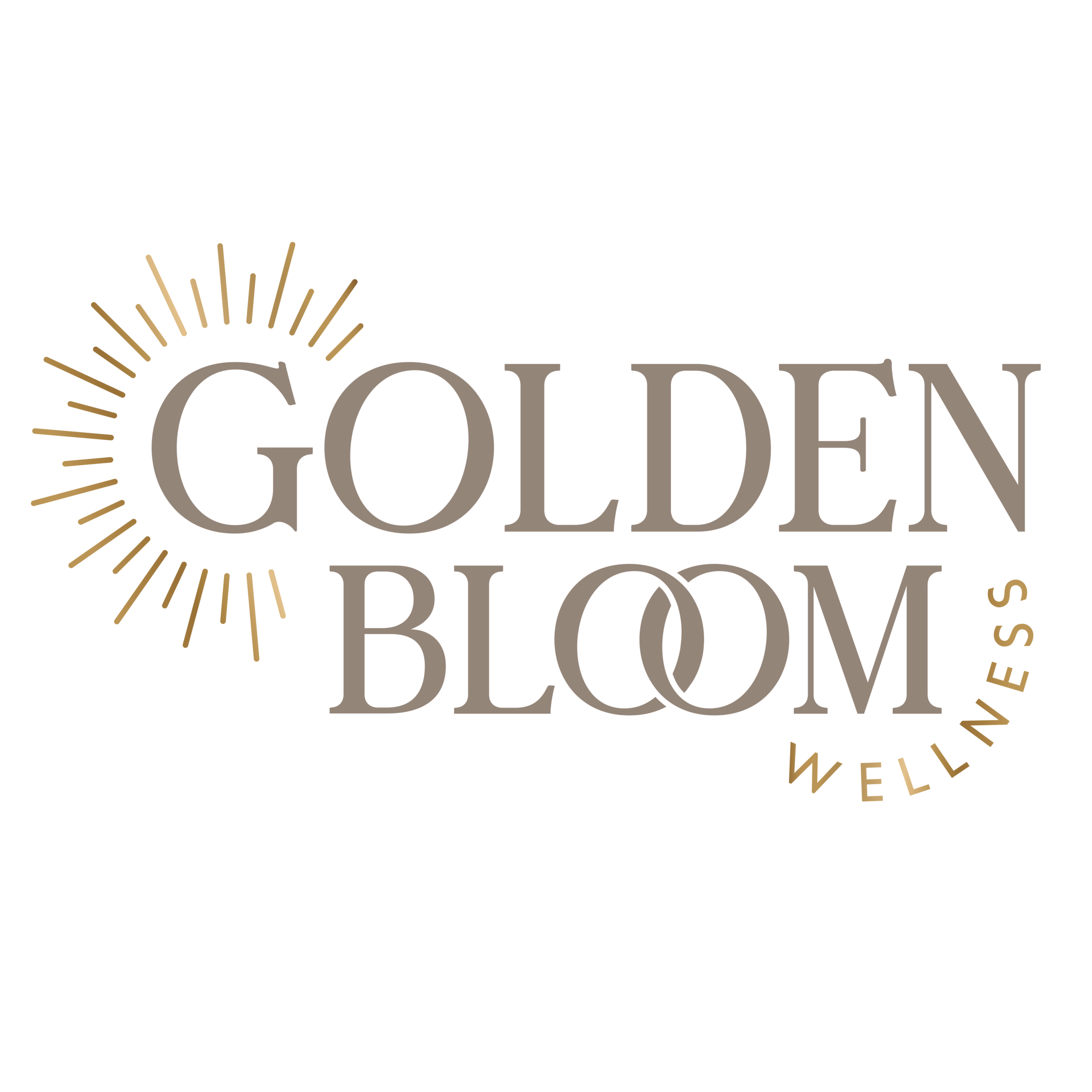Life Blooms With Healthy Mushrooms!
Increase focus, performance and immunity with our range of natural mushroom supplements. Sold as gummies or tinctures, they're lab-tested, cruelty free and vegan. Always shipped same day.
Experience fatigue in our fast-paced world? Discover the natural energy boost in healthy mushrooms. Struggle to stay focused? Certain mushrooms enhance mental clarity. Some mushrooms can even soothe stress and support our immunity. They’re no ordinary store-bought fungi, but no worries, you don’t have to forage through the forest for them. You can take them as a supplement, like the tasty ones offered here!
Welcome To Golden Bloom Where…
Life Blooms With Healthy Mushrooms!
We believe healthy organic mushrooms are the golden cornerstone of health & vitality. Functional mushrooms can enrich our lives by promoting our immunity, focus, athletic performance, & ease stress! Plus, our crafted recipes utilize naturally delicious terpenes & additional healthy supplements to help improve the flavor & overall wellness benefits. Check out what we have to offer and “Bloom with us today!”

- Our Range of Premium Tinctures
Tincture
Liquid drops that are fast acting and perfect for on the go. Add to teas, shakes, juices, or directly on the tongue.
-
Cordyceps Mushroom Tincture [Performance]
PERFORMANCE
MUSHROOM BLEND
$37.99 — or subscribe and save 20% Select options
LIQUID DROPS -
Fusion Mushroom Blend Tincture [Immunity]
IMMUNITY
MUSHROOM BLEND
$41.99 — or subscribe and save 20% Select options
LIQUID DROPS -
Lion’s Mane + Cordyceps Tincture [Focus]
FOCUS
MUSHROOM BLEND
$37.99 — or subscribe and save up to 80% Select options
LIQUID DROPS
-
Cordyceps Mushroom Tincture [Performance]
PERFORMANCE
MUSHROOM BLEND
$37.99 — or subscribe and save 20% Select options
LIQUID DROPS -
Fusion Mushroom Blend Tincture [Immunity]
IMMUNITY
MUSHROOM BLEND
$41.99 — or subscribe and save 20% Select options
LIQUID DROPS
- 1
- 2
-
Cordyceps Mushroom Tincture [Performance]
PERFORMANCE
MUSHROOM BLEND
$37.99 — or subscribe and save 20% Select options
LIQUID DROPS
Golden Bloom’s Powerful Mushroom Tinctures
GOLDEN BLOOM COMPLEX MUSHROOM TINCTURE

Gain the wellness benefits of 14 functional mushrooms + natural terpenes!

- Our Range of Premium Gummies
Gummies
The perfect dose every time, delicious flavours, ready when you are.
-
Cordyceps Mushroom Gummies [Performance]
PERFORMANCE
MUSHROOM EXTRACT
$44.99 — or subscribe and save 20% Select options
GUMMIES -
Lion’s Mane + Cordyceps Gummies [Focus]
FOCUS
MUSHROOM EXTRACT
$44.99 — or subscribe and save 20% Select options
GUMMIES -
Mushroom Complex Gummies [Immunity]
IMMUNITY
MUSHROOM EXTRACT
$49.99 — or subscribe and save 20% Select options
GUMMIES
-
Cordyceps Mushroom Gummies [Performance]
PERFORMANCE
MUSHROOM EXTRACT
$44.99 — or subscribe and save 20% Select options
GUMMIES -
Lion’s Mane + Cordyceps Gummies [Focus]
FOCUS
MUSHROOM EXTRACT
$44.99 — or subscribe and save 20% Select options
GUMMIES
- 1
- 2
-
Cordyceps Mushroom Gummies [Performance]
PERFORMANCE
MUSHROOM EXTRACT
$44.99 — or subscribe and save 20% Select options
GUMMIES
GOLDEN BLOOM’S POWERFUL MUSHROOM Extract Gummies
Golden Bloom Mushroom Extract Gummies

Chew into these amazing gummies that have the benefits of 14 different functional mushrooms.

- Tinctures
- Gummies
Tincture
Liquid drops that are fast acting and perfect for on the go. Add to teas, shakes, juices, or directly on the tongue.
-
Cordyceps Mushroom Tincture [Performance]
PERFORMANCE
MUSHROOM BLEND
$37.99 — or subscribe and save 20% Select options
LIQUID DROPS -
Fusion Mushroom Blend Tincture [Immunity]
IMMUNITY
MUSHROOM BLEND
$41.99 — or subscribe and save 20% Select options
LIQUID DROPS -
Lion’s Mane + Cordyceps Tincture [Focus]
FOCUS
MUSHROOM BLEND
$37.99 — or subscribe and save up to 80% Select options
LIQUID DROPS
-
Cordyceps Mushroom Tincture [Performance]
PERFORMANCE
MUSHROOM BLEND
$37.99 — or subscribe and save 20% Select options
LIQUID DROPS -
Fusion Mushroom Blend Tincture [Immunity]
IMMUNITY
MUSHROOM BLEND
$41.99 — or subscribe and save 20% Select options
LIQUID DROPS
- 1
- 2
-
Cordyceps Mushroom Tincture [Performance]
PERFORMANCE
MUSHROOM BLEND
$37.99 — or subscribe and save 20% Select options
LIQUID DROPS
Golden Bloom’s Powerful Mushroom Tinctures
GOLDEN BLOOM COMPLEX MUSHROOM TINCTURE

Gain the wellness benefits of 14 functional mushrooms + natural terpenes!

Gummies
The perfect dose every time, delicious flavours, ready when you are.
-
Cordyceps Mushroom Gummies [Performance]
PERFORMANCE
MUSHROOM EXTRACT
$44.99 — or subscribe and save 20% Select options
GUMMIES -
Lion’s Mane + Cordyceps Gummies [Focus]
FOCUS
MUSHROOM EXTRACT
$44.99 — or subscribe and save 20% Select options
GUMMIES -
Mushroom Complex Gummies [Immunity]
IMMUNITY
MUSHROOM EXTRACT
$49.99 — or subscribe and save 20% Select options
GUMMIES
-
Cordyceps Mushroom Gummies [Performance]
PERFORMANCE
MUSHROOM EXTRACT
$44.99 — or subscribe and save 20% Select options
GUMMIES -
Lion’s Mane + Cordyceps Gummies [Focus]
FOCUS
MUSHROOM EXTRACT
$44.99 — or subscribe and save 20% Select options
GUMMIES
- 1
- 2
-
Cordyceps Mushroom Gummies [Performance]
PERFORMANCE
MUSHROOM EXTRACT
$44.99 — or subscribe and save 20% Select options
GUMMIES
GOLDEN BLOOM’S POWERFUL MUSHROOM Extract Gummies
Golden Bloom Mushroom Extract Gummies

Chew into these amazing gummies that have the benefits of 14 different functional mushrooms.


Sign Up & Save 20% Instantly!
Sign up with your email to receive early notice of our newest items & big sales. Unsubscribe anytime.
Golden Bloom Philosophy
Up your health & wellness game by harnessing the power of functional mushrooms + terpenes!
Golden Bloom’s Mushroom Journey
Years ago, we set out to create the absolute best mushroom supplements. While searching for the healthiest medicinal mushrooms, we also discovered the world of botanical terpenes, along with other excellent supplements & their unique health benefits!
Like mushrooms, terpenes, & other supplements like Ashwagandha, Turmeric Curcumin, and Bacopa Monnieri can make our body & mind feel more invigorated, boost our immunity, fight bacteria, provide us with extra energy & much more.
From those efforts, we crafted Golden Bloom’s specialized formulations. Our tinctures combine healthy mushrooms with added terpenes for a tasty health boost, and our gummies combine mushrooms plus other superb supplements for a deliciously healthy option. We are confident that our mushroom supplements taste & work better than average mushroom options!
The Best Mushrooms Bloom At Our Farms
All our mushrooms are grown on American USDA-certified farms. We only source mushrooms from a few farms that we carefully monitor. And our farmers have over 20 years of experience growing & processing medicinal mushrooms, so you can be confident that our products are of the highest quality!
Our Triple Extraction Process Is Our Golden Standard
Each batch of mushrooms is processed using a triple extraction method that includes fermentation, hot water, and organic food-grade alcohol. The complete process takes 120 days & yields the highest levels of Beta Glucans!
Healthy Mushrooms - Frequently Asked Questions
Cordyceps is an adaptogen, which means it has multiple compounds that can help support the body in coping with occasional stress. Adaptogen refers to a group of herbs, plants, and fungi that maintain the body’s homeostasis despite occasional external stressors. Moreover, it is rich in a compound called cordycepin, named after Cordyceps, that may offer the therapeutic potential to this mushroom.
Cordyceps are 100% natural and feature a very bright orange appearance. It has been a functional mushroom since thousands of years ago when the Chinese started using herbal medicines. Today, Cordyceps may help improve your overall wellness routine. Taking the proper dosage can support energy and endurance and enhance immune function.
Cordyceps is native to the US. You can see it growing on moth larvae. However, the roots of Cordyceps date back thousands of years in North Sikkim. Back then, this mushroom was a prized medicine in traditional Chinese herbalism.
The traditional healers in Sikkim used it as a single drug or in combination with other herbs to treat all diseases. But according to a recent study, the local folk healers or traditional healers in Sikkim used cordyceps to treat 21 ailments. More recently, Cordyceps has shown high potential in improving the immune and other energy-supporting properties.
One of the significant benefits of Cordyceps is that it can help support cellular energy and endurance. As a result, this mushroom has the potential to cope with occasional stress by boosting the adrenals in the body. Additionally, Cordyceps may enhance lung capacity and oxygen uptake.
Whether you’re an athlete or someone who wants to destress a bit about life – Cordyceps is suitable and safe to use. This functional mushroom can support various athletic performances while promoting a healthy respiratory system. For example, Cordyceps can help provide healthy oxygen levels in the bloodstream if you go to the gym often.
There are many ways to take Cordyceps. You can eat it with your favorite snack or mix it with your post-workout smoothie. Cordyceps products come in different types. It includes tinctures, capsules, powders, and other edibles. You have to choose which one would fit your lifestyle.
For example, the most bioavailable way to consume cordyceps is through tinctures or concentrated liquid extracts. The body can absorb this component fast, which means you’ll feel its effects faster and more robust. Take it sublingually or consume it with your favorite drinks. On the other hand, capsules offer a more straightforward way of incorporating Cordyceps into your busy routine. Before athletic training, Cordyceps can be beneficial. However, make sure to consume it with caution.
You can take Cordyceps whenever you need a little energy boost. For example, some people add it to their morning rituals, while other consume it before their fitness regime. On the other hand, older adults have traditionally used Cordyceps for maintaining a healthy libido. In addition, this functional mushroom may promote healthy testosterone levels within normal ranges.
Experts say that it generally takes at least two weeks to notice the full effects of functional mushrooms. However, it is ideal for taking a week off after every four to six months of consumption. Still, Cordyceps can give you an energy boost before all the hustle and bustle of the day begins.
Cordyceps is safe for consumption for as long as you take the proper dosage that an average body can handle. Generally, the safe dosage for most people is 3 to 6 grams daily for up to a year. There may be minor side effects like constipation, stomach discomfort, and diarrhea. However, these are just minor setbacks. The benefits of Cordyceps still outweigh its side effects.
For safer consumption, always start with minimum dosing suggestions. You can always increase the advised dose if your body needs an additional support. Note that all bodies react differently to herbal supplements.
Lions Mane mushrooms are natural “nootropic,” a supplement that can help promote healthy neurological functions. It can support the brain’s activity when controlling memory, mood, motivation, and more. With its mind-boosting effects, mycologists call this functional mushroom the “smart mushroom.” Lions Mane mushrooms are top of their class when it comes to supporting healthy cognitive functions.
Aside from being beneficial, these functional mushrooms are relatively easy to identify in nature. Lions Mane’s appearance features a shaggy white appearance in large sizes. It has a lobster and crab-like texture. Many chefs and herbalists have been using Lions Mane for centuries because it’s tasty on the palate.
Lions Mane is popular in Asia, specifically in China, Korea, and Japan. Thus, it is said that the roots of this mind-boosting mushroom date back to thousands of years ago, when traditional healers started using herbal medicines. Today, Lions Mane also grows naturally in North America and even Europe. You can see this mushroom growing on logs, stumps, and decaying trees in the United States.
Lions Mane is good for its mind-boosting benefits. It contains several compounds that can stimulate the production of the Nerve Growth Factor. As a result, it plays an essential role in the development and survival of nerve cells (neurons), especially those responsible for transmitting sensations of pain, temperature, and touch. Lions Mane can also support the immune system and overall health.
Do you want to improve your mental clarity, focus, and memory? Lion’s Mane can be an excellent supplement if you want to boost your concentration throughout a day full of meetings and work. At the same time, you can have a better mood. Overall, this functional mushroom is beneficial for getting you through a hectic day.
You can consume Lions Mane mushrooms in a variety of ways. There are various Lions Mane products that you can choose from. It includes foods like powders, tinctures, and capsules. You have to pick the one that best fits your way of daily life. You can have it with your preferred snack or take it during your office break.
For example, you can take Lions Mane tinctures in the morning, even with an empty or full stomach, to give you that boost to get through the day. There are also powders that you can add to your favorite drink. Conversely, you can take Lions Mane capsules like an everyday multivitamin soft gel after finishing your lunch.
For some, the best time to take Lions Mane is during the morning before they get to work. But there’s no right or wrong time when consuming Lions Mane. You can take it anytime you need additional ‘focus’ support. It is entirely up to you what time works best for you.
Lions Mane mushrooms are safe to eat. You can eat it raw, cooked, or take it in the form of powder, capsules, or tinctures. Regardless of how you take it, this functional mushroom can deliver mind-boosting benefits to help the cognitive part of the brain for better focus, clarity, and concentration. In addition, it can relieve anxiety and improve digestion.
When consuming Lions Mane products, stick to the recommended dosage. Then, you can adjust the dosage if you feel that your body is not getting its needed support. However, you might want to refrain from eating Lions Mane mushroom if you’re allergic to it. There may be some minor side effects, which are treatable with over-the-counter medicines.
Chaga mushrooms resemble a dark clump of dirt with bright orange tissue beneath their exterior. Chaga mushrooms don’t taste like a regular mushrooms that you can find in a grocery store. Instead, it has an earthy natural flavor with a slight bitterness. You can see it growing on birch trees throughout the northern hemisphere.
Although it may not look appetizing in taste and appearance, it remains a beneficial mushroom that’s been gaining popularity even in the Western world. It’s because of the Chaga’s potential health benefits due to high levels of antioxidants. So it deserves a spot on your list of the best functional mushrooms.
Chaga mushrooms have been around Siberia and other parts of Asia for centuries. Traditional healers first used it as a medicine to help boost the body’s immunity and improve overall health. It grows on the bark of birch trees in countries with cold climates like Northern Europe, Siberia, Russia, Korea, Northern Canada, and Alaska.
The first historical use of Chaga was around the 12th century in Western Siberia by the Khanty people. They mostly used Chaga tea to detox their bodies and smoked Chaga mushroom to improve their lung health. In addition, the Khanty people are said to invent Chaga soap mixed with natural anti-inflammatory benefits and soothe skin sores.
Chaga was traditionally ground into a fine powder and used to make herbal tea. It has been used as a traditional medicine for millennia in Russia and other nations of Northern Europe, primarily to increase immunity and general health. Moreover, traditional healers used it to treat heart disease, diabetes, and several malignancies.
Currently, people are reaping the benefits of Chaga mushrooms. Some current users reported that it helped boost their immune system. Moreover, this functional mushroom can also help with protection from UV radiation, support healthy aging, and improve overall skin health.
The flavor of Chaga mushroom may not appeal to everyone. Otherwise, you can mix it with your favorite drink to get its beneficial compounds that can support minds and bodies. Nowadays, there are lots of options for you to take Chaga mushroom and feel its effects.
You can take charge in the form of tinctures. It is a concentrated liquid supplement if you’re the kind of person who’s always ‘on the go.’ Chaga capsules are also available if you want to take them with other supplements you’re already drinking. On the other hand, Chaga powders are highly versatile to add to your daily routine. You can mix it with your favorite drinks, stir, and drink.
Take Chaga mushrooms whenever you feel the need to drink them. To avoid forgetting about taking Chaga mushrooms, some people like to take them first thing in the morning. Meanwhile, others prefer to take them in the middle or late at night, so they are not taking them on an empty stomach.
Functional mushrooms are excellent since they are simple to include in your daily lifestyle. You don’t have to rearrange your schedule; you must find time to consume it. It’ll only take a few seconds to take Chaga mushrooms, so that it wouldn’t hurt your busy schedule anyway. In return, Chaga can assist in promoting a healthier mind and body throughout the day.
Generally, Chaga is safe to eat or drink as tea. However, it’s better to consume it in different Chaga products since it has an unpleasant taste. Before adding Chaga to your routine or increasing its use, speak with your doctor. Herbs used in supplements are more potent than those used in food. In addition, some medications may potentially interfere with them and change how they function. Understand what functional mushrooms can do to your body to avoid adverse effects.
Turkey tail mushrooms are one of the world’s most abundant and well-studied functional mushrooms. It looks like a clamshell with a striped body and endless bands of color, ranging from white and brown to blue and gray. The overall appearance somehow resembles a turkey’s tail.
When it comes to flavor, some people describe it as slightly bitter with a hind of earthy natural flavor. However, these mushrooms have been used as a health supplement for ages. For example, in traditional Chinese medicine, Turkey Tail was used to treat respiratory ailments. Moreover, this functional mushroom contains various powerful antioxidants that may help boost the immune system.
Turkey Tail’s roots can be traced back to the Ming Dynasty, which was during the 14th century. Back then, traditional healers in China used it to support the overall well-being of its people. They believed this herbal mushroom had the potential to support the upper respiratory, digestive, and urinary tract.
But generally, Turkey Tail mushroom grows in different places. It is native to Europe, Asia, and North America. So you can see some of it growing when you hike or trail run in the forests of these countries. However, it is generally found throughout mixed hardwood deciduous forests or clusters of fallen branches and logs.
Turkey Tail helps in promoting a healthy immune system. Turkey tail is a potent mushroom with additional particular substances that can boost healthy immune responses. Moreover, this beneficial mushroom consists of adaptogenic qualities that help the mind and body adapt to everyday stress. Thanks to prebiotic fiber from Turkey Tail, it can support your gut health and digestive tract. Thus, it helps you become more balanced, prevent obesity, and stay healthy.
You can eat or drink it in powder form, but the flavor of Turkey Tails is not as tasty as other mushrooms that you can buy from groceries. If not, you can combine it with your preferred beverage to obtain its healthy compounds, which can assist the body and the mind. There are several ways today to consume Turkey Tail mushrooms.
The most common way to take turkey tail in traditional Chinese herbalism is tea (which is one of the simplest types of herbal extractions). However, there are several methods to enjoy turkey tail mushrooms in the modern world.
Nowadays, it comes in the form of tinctures. If you’re constantly “on the go,” there are Turkey Tail capsules that you can drink with your other supplements. On the other hand, you can add Turkey Tail powders into your favorite beverages and consume them.
Turkey Tail can work like a multivitamin – you can drink it in the morning or after lunch to power you up throughout the day. Generally, you can take Turkey Tail at any moment that feels most convenient for you. No matter what time you take it, it will sustain your body.
The best part about functional mushrooms is how simple it is to add them to your already hectic schedule. If you can’t find time to drink it the whole day, you can even take Turkey Tail before bed.
Turkey tail mushrooms are safe. However, some research studies revealed that it might have a few side effects. For example, some people may encounter digestive issues such as gas, bloating, and black stools when consuming turkey tail mushrooms. So, it’s essential to purchase Turkey Tail mushrooms that are 100% organic. In addition, it ensures you only receive quality products.
More importantly, consume Turkey Tail products according to the dosing instructions. You can adjust the dosage if you feel that your body is not receiving the necessary support. For example, suppose you are allergic to it. In that case, you might avoid consuming Turkey Tail mushrooms and other products with it as the main ingredient.
All retail orders received by gbmusrooms.com are typically shipped within three business days of purchase and in most situations sooner. We ship orders out Monday through Saturday. Any purchases made after Saturday (4 pm PST) will be shipped the following Monday.
Please be aware that overnight and/or expedited shipping times refer to the time an order takes to ship according to the chosen shipping method, rather than the time it takes to send an order.
If a package is returned due to an incorrect address provided during the checkout, Golden Bloom Wellness reserves the right to charge additional shipping. Requests for shipping information can be sent to [email protected].
It is our goal to send out orders as quickly as possible. Please be mindful and ready to accept your order as it arrives. Tracking your order is highly recommended as shipping times can vary depending on the delivery service used.











